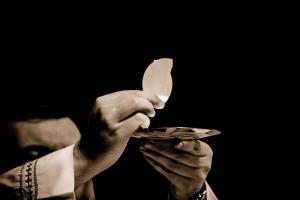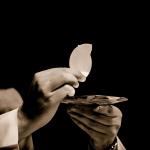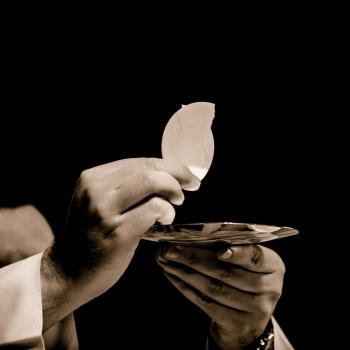
One Sunday morning, the Pastor noticed little Alex was staring up at the large plaque that hung in the foyer of the church. The plaque was covered with names and small American flags were mounted on either side of it. The seven-year old had been staring at the plaque for some time, so the Pastor walked up, stood beside the boy, and said quietly, “Good morning, Alex.”
“Good morning, Pastor.” replied the young man, still focused on the plaque. “Pastor McGhee, what is this?” Alex asked.
“Well son, it’s a memorial to all the young men and women who died in the service.”
Soberly, they stood together, staring at the large plaque. Little Alex’s voice was barely audible when he asked, “Which service, the 8:30 or the 11:00?”
The story has the feel of a preacher’s joke, and that might be all it is. But, at the same time, I am quite sure that for some people the story gives vivid expression to the way that people think about worship services.
An all but meaningless exercise. No more than a ritual, a jumble of words repeated every Sunday. Something to be endured. Maybe even boring enough to be lethal.
But what we want to do over the next five Sundays in this mini-series on the Eucharist is to offer you a window into the beauty, power, and significance of this liturgical gift that we have been given. Our goal isn’t just to inform. We hope that your experience of worship will also be deepened and – by deepening your experience of worship – we hope to also deepen your spiritual lives. As with our series on doubt, in adult formation we will focus on the previous Sunday’s sermon.
The lectionary readings will not always work with our sermons but this Sunday’s gospel does and I will focus on just two lines of it:
Jesus said, “Those who eat my flesh and drink my blood abide in me, and I in them. Just as the living Father sent me, and I live because of the Father, so whoever eats me will live because of me. (John 6:56-57)
One of the things that I think is hardest to grasp about our worship is its fundamental character. Our frame of reference for what we do on Sunday is too easily confused with theater.
There is an audience. A stage. Performers. A program. And – probably for a lot of people – it looks like something to watch or to entertain. Maybe a bit of classroom, with information to consume. Maybe a bit of a performance, with music to be enjoyed.
And there are certainly worship services that feel more like that, than do others. I think I told you, that when my daughter was trying to define the difference between what here childhood experience of worship and the non-denom she and her husband attend now, she was stuck for words. But when I explained that what she was experiencing now was a cross between a rock concert and a Ted Talk. She instantly knew what I was talking about.
I didn’t mean it badly. The non-denom approach to worship is meant to lift our hearts and impart God’s truth. I like concerts and Ted Talks. And, for millions of Americans a combination of the two is a perfect fit worship-wise.
Truth be told, depending on your perspective, we Episcopalians don’t even benefit from the comparison. We use a liturgy that is more than 2000 years old. A large part of our service is devoted to carefully crafted theological language that leaves no room for modern metaphors and vocabulary. And some of it is pretty purple. In Rite one we use phrases like “the innumerable benefits procured unto us by the same”. That is certainly a mouthful!
As priests, we even try to keep the question of our own personalities at the fringe of things by wearing vestments. So, there’s no playing the part of “theo bro” – or “gal” – by wearing jeans, a black t-shirt, and an edgy haircut.
But here is the important thing to remember: We don’t believe that the Eucharist is a performance. It is not a ritual. And it is not about appealing to your emotions.
It is actually something very different. Let me outline the principal differences.
Some of our Christian brothers and sisters believe that when we celebrate communion and take the bread and the wine what we are doing is remembering. We are remembering what Jesus did with his disciples. We are thinking back to “the upper room”. We are remembering a moment in the past.
Not here. Yes, the first supper was the supper with Jesus and his disciples and we do remember what he did. But on this day, we also celebrate that supper anew. And you are, in this moment, the new twelve.
This doesn’t mean that the “first twelve” are irrelevant. It doesn’t even mean that they are absent. Our prayers are theirs and their prayers are ours. But this is not a meal stuck in the past – in either its power or its significance. It is a meal of preparation and empowerment. And just as Jesus called the first Twelve to carry the good news that his life is available to everyone, now you are called to carry that good news into the world.
As with the first supper, Jesus also continues to be the host of the meal. We are only stand-ins, for Jesus. The servants at his table. And the value of this meal does not lie with us or with the denomination. It depends upon the healing work of Jesus, who heals us and makes us whole. As Mother Natalie and I wash our hands just before communion, she prays, “May the Lord accept the sacrifice at our hands that we may perfectly present and represent his sacrifice for the praise and glory of his name, for our good and the good of all his holy Church.”
Maybe the biggest difference, however, is this: Some of our brothers and sisters believe that when we take the bread and the wine what we are doing is just symbolic. It is an abstraction — at most, a mental affirmation.
But for us the Eucharist is the enactment of a new way of life. And, as such, the Eucharist is the defining, the guiding, the central practice of our spiritual path.
Other Christians will describe their spiritual life differently. They will talk about their prayer life. They will talk about the gift of silence. They will talk about their connection with God’s creation. And all these experiences are important.
But in the Episcopal and Anglican tradition, where our worship revolves around the Eucharist, we are saying – and doing – something very different. As important as these other experiences are, we worship on Sundays in the way that we do because we believe that in receiving the body and blood of Christ, we are actually taking the life of Christ into our own lives.
We are letting his flesh and his blood become a part of our own flesh and blood. We are letting his connection, his intimacy with the Father govern our lives, just as that connection governed his life. And by letting that reality be enacted in our lives every Sunday, his victory over death is conquering death in our own lives – healing and restoring the image of God in each and everyone of us.
We are letting his purpose become our purpose. We are letting his love govern our relationship with our spouses, our relationship with our children, our relationship with our friends. And out of that transformation, we are carrying an awareness of his presence into the way in which we navigate each day, at work, as neighbors, as citizens.
This is the path that follows on our baptism. We were baptized into Christ and now we receive Christ, letting him fill us. And that is why we celebrate the Eucharist every week. As John notes, when we eat the body of Christ and drink his blood, we do it so that we might live. And without it, we die.
The Eucharist should also shape the way that we think about our lives. You see, in using bread and wine, body and blood, the Eucharist teaches that Jesus is breathing life into us as people who are both spiritual and physical. The unity of both. And that God’s intention for us does not lie just beyond the grave but is meant to take hold of our lives now, without delay.
Our situation underlines how urgent that spiritual reorientation is. The separation of the spiritual, moral, intellectual, and physical in modern western thought has been the single, most corrosive idea now for centuries. When we surrendered to the notion that God is out there – if he is anywhere at all – and when we bought into the idea that our bodies are machines with free-floating souls – if we have souls at all – we opened ourselves to enormous, death-dealing harm.
We created space for the idea that:
We are the masters of the universe.
What we did with our bodies was our own business and that it had no implications for our own spiritual well-being or that of others.
That our rights mattered more than our responsibilities before God.
That what people didn’t know wasn’t a problem.
That the ends justifies the means
That if we were technologically capable of doing something, there was no reason not to.
And, as a result, we longer live in a world broadly shaped by Christian categories. We don’t live in a post-Enlightenment world either, where at least a healthy practice of reason held on for a while. Instead, we live in a post post-Enlightenment world. Where…
Lying is a regular feature of our public discourse.
Perceptions and feelings are everything.
Where we can ignore God-given realities about our lives.
And we can concoct identities for ourselves that are devoid of connection with God-given realities.
And even our commitment to reason has slipped so badly that even scientific data and the proceeds of reason can be freely distorted, if you have the right end in mind.
The Eucharist is a word of hope and direction in a world that has lost its moorings. And an invitation to look to let the presence of the Risen Christ to fill us, direct us, and shape us.
Gracious God, we live in a world that challenges us. We find ourselves stretched and confused. The institutions we have depended upon no longer instill confidence in us. And we find our own resources are limited and threadbare. But at your altar we are invited to receive your life and to allow your life to transform the way in which we navigate life. As we receive your body and your blood, lead us into all truth, guide us in every circumstance, and deepen our lives in you. This we ask in the name of your Son, our Savior, Jesus Christ, who with you and the Holy Spirit, reign one God, now and forever. Amen.












